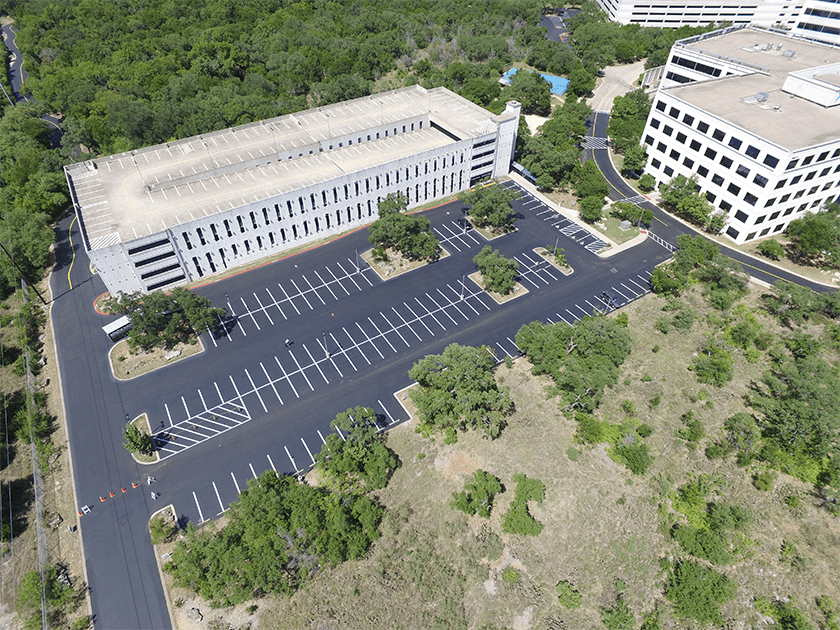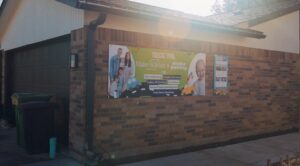If you have ever asked a contractor to seal your asphalt pavement, you probably know that rain will delay the job, the contractor must repair cracks and other breaks first, the pavement must be clean, and the application must be correct. However, when sealcoating pavements, four weather-related factors can impact the success of the project. These factors are somewhat interrelated, and they all involve the sealant’s curing process. The four factors are humidity, wind speed, temperature, and sunlight, and they all play a role in the sealant’s ability to evaporate the water it contains.
What Factors Must Contractors Consider When Sealcoating in the Spring?
Why Is Humidity a Factor When Applying Sealcoating?
Humidity represents the amount of water vapor or moisture in the air at the time of the measurement. A humidity level of 100% means no room left in the air to accept additional moisture. Humidity readings can reach this level during heavy thunderstorms or prolonged rainfalls. At the other extreme, many deserts have daytime humidity levels as low as 10%, allowing water to evaporate very quickly. Although they must consider all weather-related factors, asphalt sealing contractors typically will not apply sealants if the humidity level is above 90%.
How Does Wind Affect Sealant Applications?
Molecules of water escape from a sealant as part of the process of evaporation. However, these molecules tend to remain directly above their exit points, making the air just over the sealant more humid. Even a light breeze can move the air containing the water molecules out of the way so that more moisture can evaporate from the sealant.
How Does Temperature Affect the Curing of Asphalt Sealants?
Suppose you place a pan of water on a stovetop burner set to its highest temperature. In that case, the water will evaporate much faster than it will from an identical pan of water sitting on a kitchen countertop. Evaporation is primarily the result of molecules colliding with each other and bouncing into the air. The speed and force of the colliding molecules depend on the temperature of the liquid containing them. Molecules move faster at higher temperatures than at lower ones. The minimum temperature for a successful sealant application is typically around 50 degrees Fahrenheit.
Why Do Asphalt Contractors Want Sealants to Receive Several Hours of Sunlight?
Sunlight creates heat, but it also renews it. In physics, when two materials having different temperatures are placed next to each other, they will transfer heat until their temperatures are approximately the same. Sunlight renews the original heat, helping the sealant cure faster. Most contractors want sealants to receive at least three or four hours of direct sunlight immediately after application.
How Are the Four Factors Interrelated?
Each factor in asphalt sealcoating plays a role in evaporation. Temperature and sunlight affect water molecules’ movement, humidity levels affect how easily the water molecules can escape from the sealant, and wind helps move saturated air away from the sealant. If one factor is borderline, the other factors can influence whether an Austin paving company will apply a sealant. For example, when the temperature is 52 degrees, contractors might be willing to apply a sealant if it is a sunny day with a humidity level of 50%. Still, they may be unwilling to perform the task if the humidity is 70% and skies are overcast.
Trust Alpha, the Asphalt Sealcoating Experts
In many years, Alpha Paving applies more gallons of sealants than some competitors apply in a decade. We know what it takes to deliver high-quality results, and we guarantee that you will be pleased with our work. We also offer asphalt paving, parking lot striping, concrete work, thermoplastic pavement markings, asphalt patching, road construction, asphalt overlays, sealcoating, car stops, traffic signs, parking lot maintenance, asphalt milling, speed bump installation, street maintenance, and asphalt crack repairs. We serve HOAs and subdivisions, property management firms, retailers, churches, municipalities and counties, health care facilities, condominiums, educational institutions, and other commercial clients in most parts of Central Texas from our Round Rock headquarters. We have impeccable references, an immaculate reputation, and the staffing, skills, and equipment to handle projects of all types and scopes. Fill out the online form to request a free quote, or give us a call at 512-677-9001.




